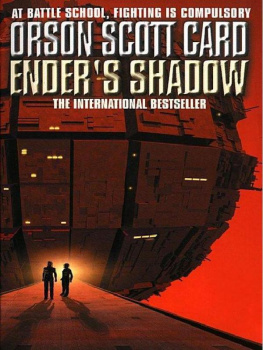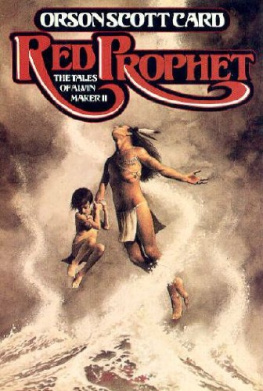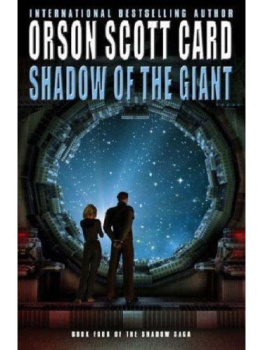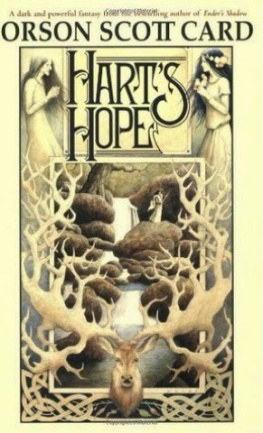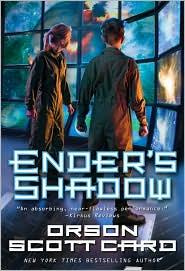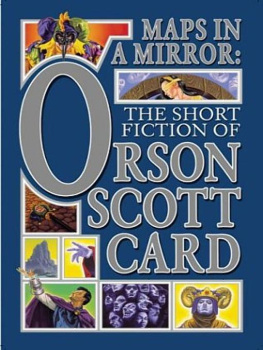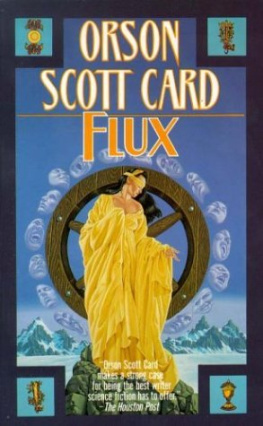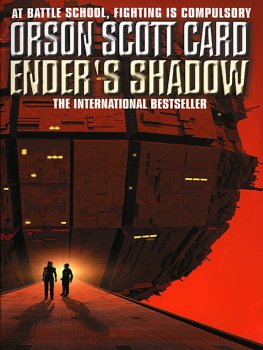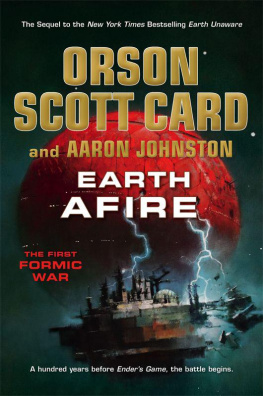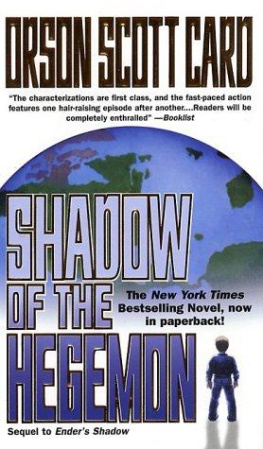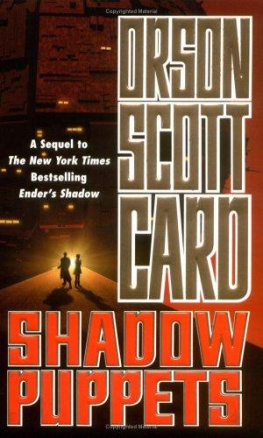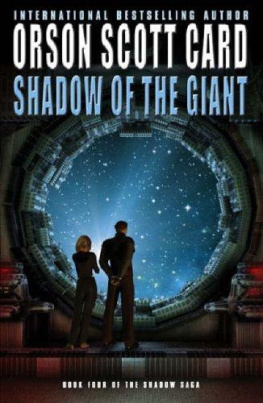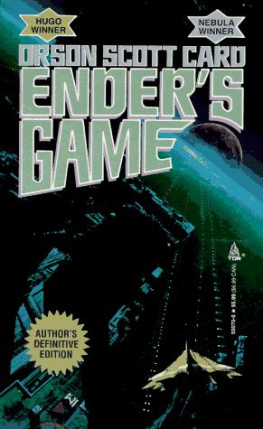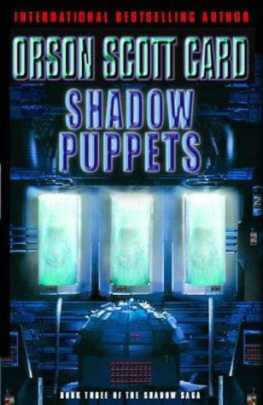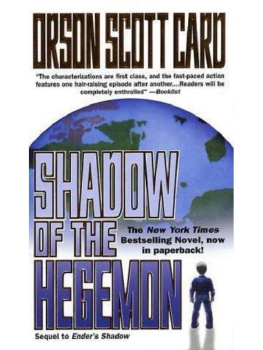Orson Scott Card - Enders Shadow (The Shadow Saga)
Here you can read online Orson Scott Card - Enders Shadow (The Shadow Saga) full text of the book (entire story) in english for free. Download pdf and epub, get meaning, cover and reviews about this ebook. year: 2000, publisher: Orbit, genre: Detective and thriller. Description of the work, (preface) as well as reviews are available. Best literature library LitArk.com created for fans of good reading and offers a wide selection of genres:
Romance novel
Science fiction
Adventure
Detective
Science
History
Home and family
Prose
Art
Politics
Computer
Non-fiction
Religion
Business
Children
Humor
Choose a favorite category and find really read worthwhile books. Enjoy immersion in the world of imagination, feel the emotions of the characters or learn something new for yourself, make an fascinating discovery.
- Book:Enders Shadow (The Shadow Saga)
- Author:
- Publisher:Orbit
- Genre:
- Year:2000
- Rating:3 / 5
- Favourites:Add to favourites
- Your mark:
- 60
- 1
- 2
- 3
- 4
- 5
Enders Shadow (The Shadow Saga): summary, description and annotation
We offer to read an annotation, description, summary or preface (depends on what the author of the book "Enders Shadow (The Shadow Saga)" wrote himself). If you haven't found the necessary information about the book — write in the comments, we will try to find it.
Enders Shadow (The Shadow Saga) — read online for free the complete book (whole text) full work
Below is the text of the book, divided by pages. System saving the place of the last page read, allows you to conveniently read the book "Enders Shadow (The Shadow Saga)" online for free, without having to search again every time where you left off. Put a bookmark, and you can go to the page where you finished reading at any time.
Font size:
Interval:
Bookmark:
TO DICK AND HAZIE BROWN
IN WHOSE HOME NO ONE IS HUNGRY
AND IN WHOSE HEARTS
NO ONE IS A STRANGER
Contents
20.
Foreward
This book is, strictly speaking, not a sequel, because it begins about where Ender's Game begins, and also ends, very nearly, at the same place. In fact, it is another telling of the same tale, with many of the same characters and settings, only from the perspective of another character. It's hard to know what to call it. A companion novel? A parallel novel? Perhaps a "parallax," if I can move that scientific term into literature.
Ideally, this novel should work as well for readers who have never read Ender's Game as for those who have read it several times. Because it is not a sequel, there is nothing you need to know from the novel Ender's Game that is not contained here. And yet, if I have achieved my literary goal, these two books complement and fulfill each other. Whichever one you read first, the other novel should still work on its own merits.
For many years, I have gratefully watched as Ender's Game has grown in popularity, especially among school-age readers. Though it was never intended as a young-adult novel, it has been embraced by many in that age group and by many teachers who find ways to use the book in their classrooms.
I have never found it surprising that the existing sequels -- Speaker for the Dead , Xenocide , and Children of the Mind -- never appealed as strongly to those younger readers. The obvious reason is that Ender's Game is centered around a child, while the sequels are about adults; perhaps more important, Enders Game is, at least on the surface, a heroic, adventurous novel, while the sequels are a completely different kind of fiction, slower paced, more contemplative and idea-centered, and dealing with themes of less immediate import to younger readers.
Recently, however, I have come to realize that the 3,000-year gap between Enders Game and its sequels leaves plenty of room for other sequels that are more closely tied to the original. In fact, in one sense Enders Game has no sequels, for the other three books make one continuous story in themselves, while Enders Game stands alone.
For a brief time I flirted seriously with the idea of opening up the Enders Game universe to other writers, and went so far as to invite a writer whose work I greatly admire, Neal Shusterman, to consider working with me to create novels about Ender Wiggin's companions in Battle School. As we talked, it became clear that the most obvious character to begin with would be Bean, the child-soldier whom Ender treated as he had been treated by his adult teachers.
And then something else happened. The more we talked, the more jealous I became that Neal might be the one to write such a book, and not me. It finally dawned on me that, far from being finished with writing about "kids in space," as I cynically described the project, I actually had more to say, having actually learned something in the intervening dozen years since Enders Game first appeared in 1985. And so, while still hoping that Neal and I can work together on something, I deftly swiped the project back.
I soon found that it's harder than it looks, to tell the same story twice, but differently. I was hindered by the fact that even though the viewpoint characters were different, the author was the same, with the same core beliefs about the world. I was helped by the fact that in the intervening years, I have learned a few things, and was able to bring different concerns and a deeper understanding to the project. Both books come from the same mind, but not the same; they draw on the same memories of childhood, but from a different perspective. For the reader, the parallax is created by Ender and Bean, standing a little ways apart as they move through the same events. For the writer, the parallax was created by a dozen years in which my older children grew up, and younger ones were born, and the world changed around me, and I learned a few things about human nature and about art that I had not known before.
Now you hold this book in your hands. Whether the literary experiment succeeds for you is entirely up to you to judge. For me it was worth dipping again into the same well, for the water was greatly changed this time, and if it has not been turned exactly into wine, at least it has a different flavor because of the different vessel that it was carried in, and I hope that you will enjoy it as much, or even more.
-- Greensboro, North Carolina, January 1999
Part One
URCHIN
Poke
"You think you've found somebody, so suddenly my program gets the ax? "It's not about this kid that Graff found. It's about the low quality of what you've been finding. "We knew it was long odds. But the kids I'm working with are actually fighting a war just to stay alive. "Your kids are so malnourished that they suffer serious mental degradation before you even begin testing them. Most of them haven't formed any normal human bonds, they're so messed up they can't get through a day without finding something they can steal, break, or disrupt. "They also represent possibility, as all children do. "That's just the kind of sentimentality that discredits your whole project in the eyes of the I.F.
Poke kept her eyes open all the time. The younger children were supposed to be on watch, too, and sometimes they could be quite observant, but they just didn't notice all the things they needed to notice, and that meant that Poke could only depend on herself to see danger.
There was plenty of danger to watch for. The cops, for instance. They didn't show up often, but when they did, they seemed especially bent on clearing the streets of children. They would flail about them with their magnetic whips, landing cruel stinging blows on even the smallest children, haranguing them as vermin, thieves, pestilence, a plague on the fair city of Rotterdam. It was Poke's job to notice when a disturbance in the distance suggested that the cops might be running a sweep. Then she would give the alarm whistle and the little ones would rush to their hiding places till the danger was past.
But the cops didn't come by that often. The real danger was much more immediate -- big kids. Poke, at age nine, was the matriarch of her little crew (not that any of them knew for sure that she was a girl), but that cut no ice with the eleven- and twelve- and thirteen-year-old boys and girls who bullied their way around the streets. The adult-size beggars and thieves and whores of the street paid no attention to the little kids except to kick them out of the way. But the older children, who were among the kicked, turned around and preyed on the younger ones. Any time Poke's crew found something to eat -- especially if they located a dependable source of garbage or an easy mark for a coin or a bit of food -- they had to watch jealously and hide their winnings, for the bullies liked nothing better than to take away whatever scraps of food the little ones might have. Stealing from younger children was much safer than stealing from shops or passersby. And they enjoyed it, Poke could see that. They liked how the little kids cowered and obeyed and whimpered and gave them whatever they demanded.
So when the scrawny little two-year-old took up a perch on a garbage can across the street, Poke, being observant, saw him at once. The kid was on the edge of starvation. No, the kid was starving. Thin arms and legs, joints that looked ridiculously oversized, a distended belly. And if hunger didn't kill him soon, the onset of autumn would, because his clothing was thin and there wasn't much of it even at that.
Normally she wouldn't have paid him more than passing attention. But this one had eyes. He was still looking around with intelligence. None of that stupor of the walking dead, no longer searching for food or even caring to find a comfortable place to lie while breathing their last taste of the stinking air of Rotterdam. After all, death would not be such a change for them. Everyone knew that Rotterdam was, if not the capital, then the main seaport of Hell. The only difference between Rotterdam and death was that with Rotterdam, the damnation wasn't eternal.
Font size:
Interval:
Bookmark:
Similar books «Enders Shadow (The Shadow Saga)»
Look at similar books to Enders Shadow (The Shadow Saga). We have selected literature similar in name and meaning in the hope of providing readers with more options to find new, interesting, not yet read works.
Discussion, reviews of the book Enders Shadow (The Shadow Saga) and just readers' own opinions. Leave your comments, write what you think about the work, its meaning or the main characters. Specify what exactly you liked and what you didn't like, and why you think so.

